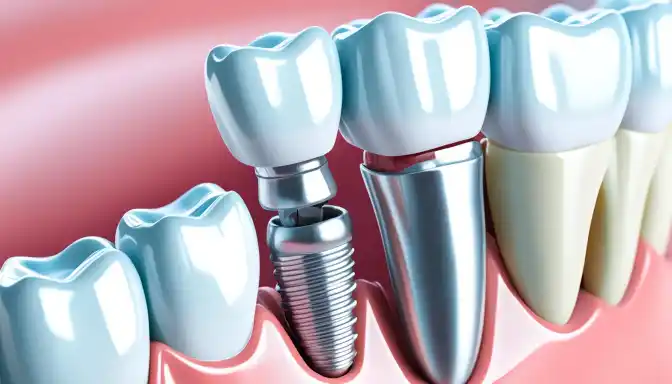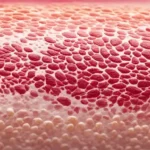Seniors Can’t Ignore These Telltale Signs of Atopic Dermatitis
Published on
6 minute read
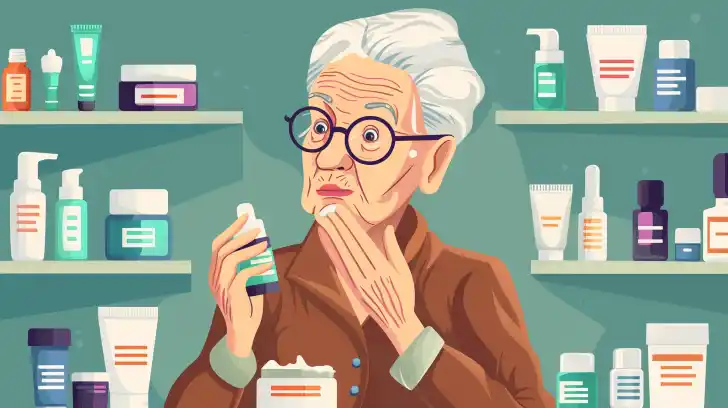
Atopic dermatitis is a common but serious skin issue in older adults. It’s more than just an annoying itch. It’s a deep, uncomfortable dryness and inflammation that spreads. Unlike simple dry skin, atopic dermatitis symptoms in seniors include constant redness and itching that need more attention. Managing it is about more than just creams. Recognizing the early atopic dermatitis signs in seniors is crucial for prompt and effective treatment.
As people age, their skin gets less resilient. This makes seniors more prone to environmental factors that worsen symptoms. Without proper atopic dermatitis treatment for seniors, this condition can severely limit life’s pleasures. But, there’s hope thanks to new treatments that alleviate the symptoms. With the right knowledge and treatments, dealing with atopic dermatitis management for seniors can allow for a better quality of life. It makes the golden years healthier and more vibrant for seniors.
Key Takeaways
- Recognizing and addressing atopic dermatitis symptoms in seniors is essential for their well-being.
- Accurate identification of atopic dermatitis signs in seniors can lead to better outcomes.
- Adequate atopic dermatitis treatment for seniors goes beyond topical remedies, involving a holistic healthcare approach.
- Proper atopic dermatitis management for seniors can greatly enhance their quality of life.
- Environmental controls and skincare modifications play a crucial role in managing atopic dermatitis in the senior population.
- Continual education and support from healthcare providers are vital in navigating atopic dermatitis.
Understanding Atopic Dermatitis in the Senior Population
Atopic dermatitis is a skin condition that causes discomfort and distress, especially for the elderly. It’s important for caregivers and healthcare providers to know about the challenges it brings to seniors. Age-related skin changes can greatly affect the progression of the disease and their quality of life.
The Science Behind Atopic Dermatitis and Age-Related Changes in Skin
As people age, their skin’s defense system weakens due to less production of key proteins like filaggrin. This protein helps keep the skin protective wall strong, shielding it from irritants and allergens. With less filaggrin, seniors are more prone to atopic dermatitis, which can lead to frequent and intense flares. Also, their skin can’t hold moisture well, leading to dryness and worsened atopic dermatitis.
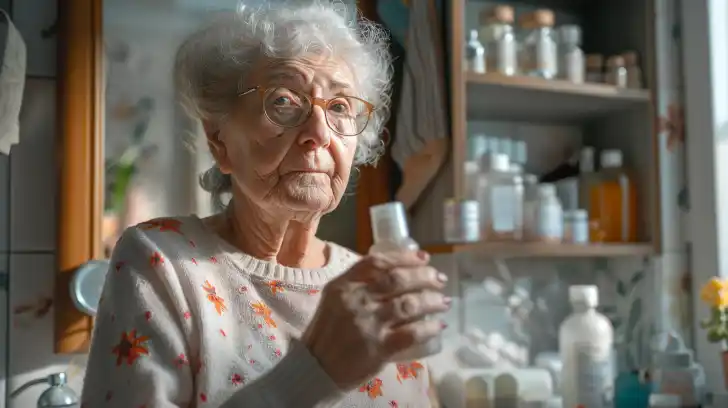
Distinguishing Atopic Dermatitis from Other Age-Related Skin Conditions
Distinguishing atopic dermatitis from conditions like psoriasis and actinic keratoses in seniors is crucial. Making the correct diagnosis is key to providing effective treatment. Each skin condition needs its unique care plan to improve seniors’ quality of life.
Environmental and Genetic Contributors to Atopic Dermatitis
It’s important to know what causes atopic dermatitis in order to manage it well. Indoor heating, too much cleansing, and genetics can all play a role in the severity and occurrence of flare-ups. Recognizing these triggers is crucial for preventing them. It also helps in changing seniors’ skincare routines to avoid these irritants.
Atopic Dermatitis Symptoms in Seniors
Atopic dermatitis requires various treatment methods, especially for the elderly. It is important to pay attention to seniors’ particular needs. This can improve both their skin condition and overall happiness.
Identifying Common Symptoms: Itchiness, Redness, and Dry Skin
Seniors often face chronic itchiness, redness, and dry skin. Their skin is thinner and produces less oil, making symptoms worse. Providing atopic dermatitis support for seniors means regularly checking these symptoms to manage the disease well.
Recognizing Exacerbating Factors: Triggers and Allergens
Environmental factors like pollen and pet dander can worsen atopic dermatitis. Irritating fabrics and harsh soaps also trigger symptoms. Knowing these triggers is key in creating effective atopic dermatitis coping strategies for seniors. Finding out which substances harm the skin helps in personalizing treatment.
When to Seek Medical Advice: Differences in Acute and Chronic Manifestations
Atopic dermatitis can appear suddenly or be a long-term issue. It is crucial for seniors to get medical help if symptoms don’t improve or get worse. Knowing when to use atopic dermatitis medications for seniors is vital. It helps decide when to switch from over-the-counter products to prescription medicines.
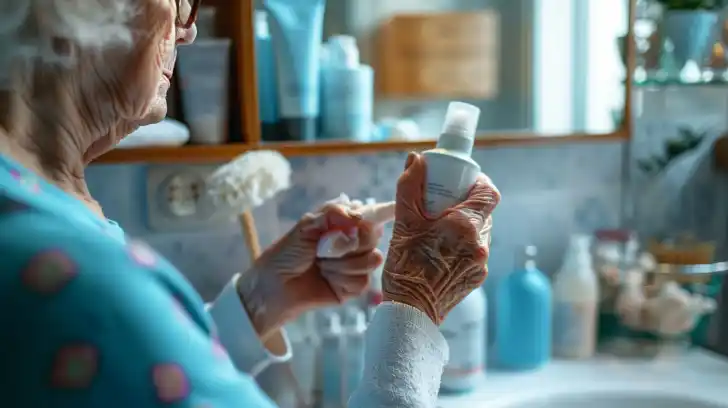
Caring for your skin properly is important when you have atopic dermatitis. Using gentle cleansers and rich, oil-based moisturizers helps protect the skin. Also, knowing about medication options, including phototherapy, gives seniors the tools to manage their condition with a doctor’s help.
Conclusion
As people get older, dealing with atopic dermatitis becomes harder. Effective management requires a mix of medical care and lifestyle changes. Treatments like atopic dermatitis topical treatments for seniors, oral treatments, and injectable treatments are key. Each treatment is chosen based on the senior’s skin and health needs. This ensures it works well and has few side effects.
To really manage atopic dermatitis, medicine alone won’t do. Using natural remedies for seniors, following a good diet, and taking the right supplements are important. These steps, along with reducing stress and improving sleep hygiene, help the skin from the inside. Also, daily habits like controlling the environment, wearing soft clothing, and keeping clean help avoid skin problems.
It’s also vital to take care of wounds and prevent infections. Being careful here stops small problems from getting worse. Taking steps for allergy management, keeping the itch under control, and providing pain relief are all important. These actions help seniors live a better and more comfortable life. Clearly, a careful and all-around approach to atopic dermatitis can greatly improve life for seniors, giving them comfort and strength against this ongoing skin problem.
FAQ
What are the most common symptoms of atopic dermatitis in seniors?
Seniors often deal with chronic itchiness, dry skin, and redness due to atopic dermatitis. This is especially true for areas like the lower legs that have fewer oil glands.
How does atopic dermatitis differ from other age-related skin conditions?
Atopic dermatitis makes skin dry and leathery, sometimes causing it to crack and bleed. It doesn’t have the thick scales seen in psoriasis or the rough patches from sun damage like actinic keratoses does.
What factors can exacerbate atopic dermatitis symptoms in the elderly?
For seniors, things like dry air, harsh soaps, irritating fabrics, and certain foods can make atopic dermatitis worse. Stress and pollen are also common triggers.
When should a senior seek medical advice for atopic dermatitis?
It’s time to see a doctor if a senior’s skin problems don’t get better with basic care. Also if the skin gets worse or the condition affects their life a lot.
What are the top management strategies for seniors with atopic dermatitis?
Management includes using mild soaps and moisturizers, and avoiding triggers. Medications and natural remedies may help, too. Reducing stress and getting enough sleep are important as well.
Can dietary choices impact atopic dermatitis in seniors?
Yes, food choices matter. Some foods may worsen atopic dermatitis. But eating anti-inflammatory foods and maybe adding omega-3 supplements can help keep skin healthy.
What types of clothing should seniors with atopic dermatitis wear?
It’s best for seniors to wear soft, breathable clothes like cotton. They should avoid tight, synthetic fabrics that irritate the skin.
How important is sleep hygiene for seniors with atopic dermatitis?
Good sleep is essential. It helps keep stress and inflammation down, which can reduce skin problems.
Are there any natural remedies recommended for atopic dermatitis in seniors?
Natural remedies like colloidal oatmeal baths, aloe vera, and coconut oil might help. But always talk to a healthcare provider before trying them.
What steps can seniors take to prevent infections with atopic dermatitis?
Keeping skin clean and moisturized helps. Also, treat open sores carefully and seek help if you notice signs of an infection.


